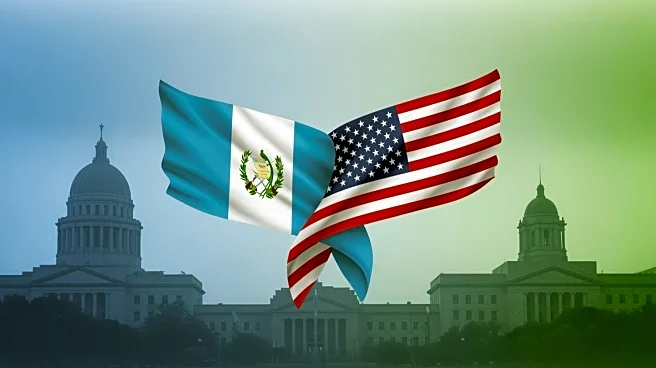What's Happening?
Guatemala is seeking assistance from the United States to address security challenges following a significant prison break. President Bernardo Arévalo announced plans to overhaul the country's prison system
after scores of gang members escaped from Fraijanes II, a maximum-security facility near Guatemala City. The escapees are believed to be high-ranking members of the Barrio 18 gang, which has been linked to organized crime and violence throughout Central America. The Trump administration recently designated Barrio 18 as a foreign terrorist organization, placing it alongside other notorious groups such as MS-13 and major drug cartels. President Arévalo emphasized the importance of U.S. support, including the involvement of the FBI and other security agencies, to strengthen Guatemala's security systems and combat organized crime effectively.
Why It's Important?
The involvement of the United States in Guatemala's efforts to combat gang violence highlights the international dimension of organized crime in Central America. The designation of Barrio 18 as a foreign terrorist organization by the Trump administration underscores the severity of the threat posed by such gangs. U.S. assistance could significantly bolster Guatemala's capacity to address security challenges, potentially reducing crime rates and improving regional stability. This collaboration may also enhance bilateral relations between the two countries, fostering greater cooperation in security and law enforcement. However, the situation also raises concerns about the effectiveness of Guatemala's current prison system and the pervasive issues of bribery and corruption that allow gangs to operate unchecked.
What's Next?
Guatemala plans to construct a new maximum-security facility as part of its efforts to reform the prison system. The involvement of U.S. security agencies is expected to provide technical expertise and resources to improve security measures and combat organized crime. The success of these initiatives will depend on the ability to address underlying issues such as corruption and the influence of gangs within the prison system. The international community will likely monitor the situation closely, as the outcomes could have broader implications for regional security and cooperation in combating transnational crime.
Beyond the Headlines
The prison break and subsequent U.S. involvement highlight the complex interplay between domestic security issues and international relations. The designation of Barrio 18 as a terrorist organization reflects a shift in how such gangs are perceived, potentially influencing future policy decisions and law enforcement strategies. The situation also underscores the challenges faced by countries like Guatemala in balancing internal reforms with external assistance, as they navigate the pressures of organized crime and corruption.











